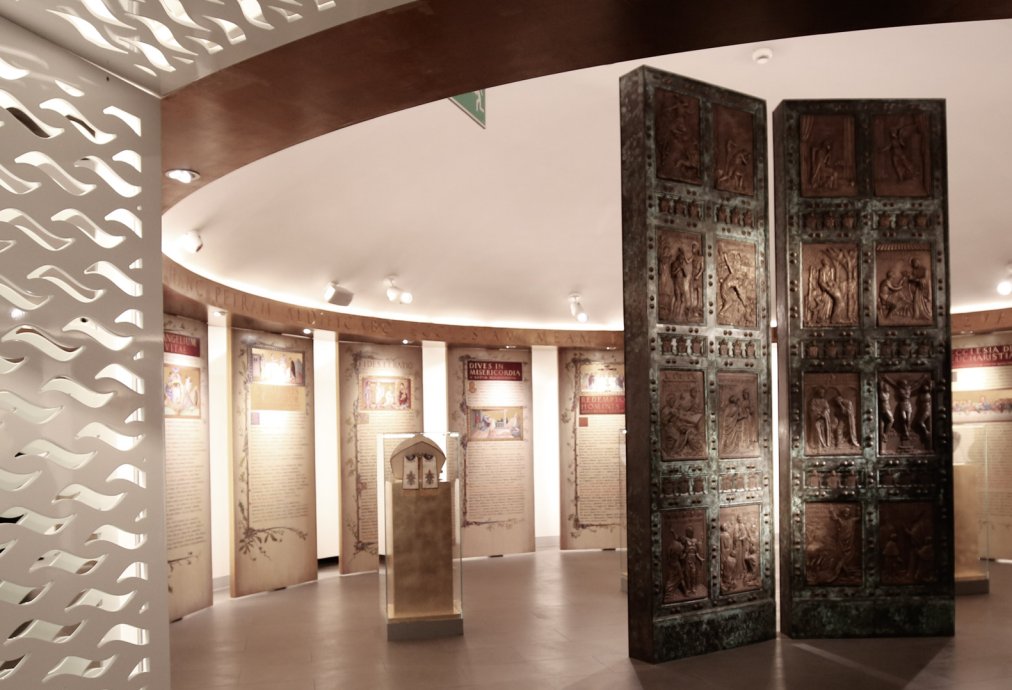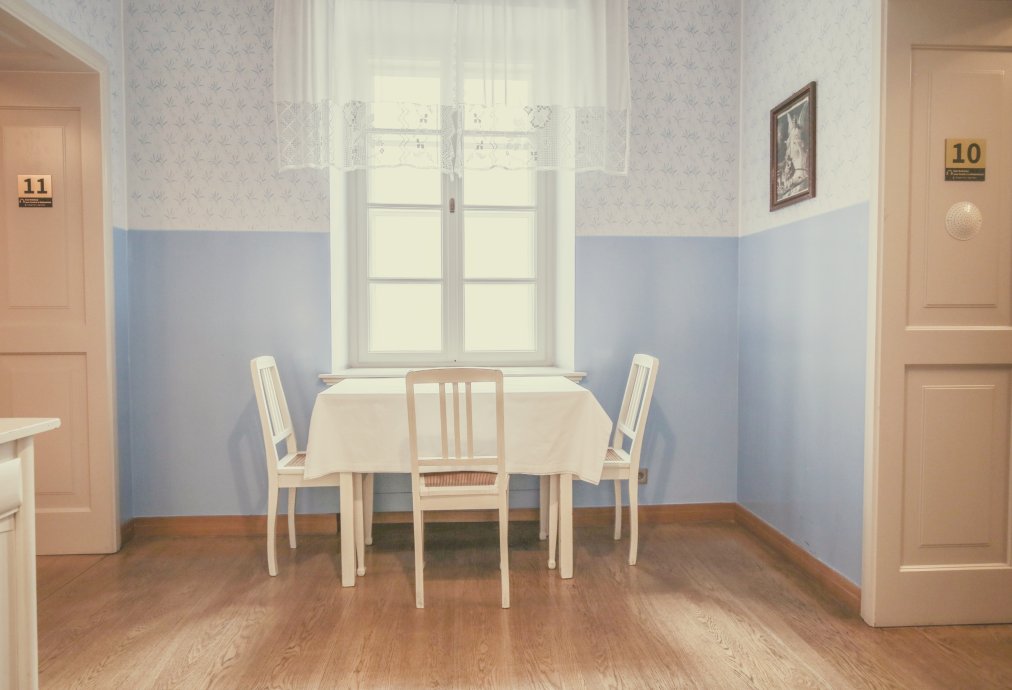
FAQ
Here you will find answers to the most frequently asked questions about visiting the Family Home of Father Saint John Paul II Museum in Wadowice. When you click on a question, the answer will expand.
Didn't find the answer to your question? Contact us! We will be more than happy to help you!
Didn't find the answer to your question? Contact us! We will be more than happy to help you!
Before visiting
-
How long does it take to visit the Museum?
Depending on the form of the tour: with a guide 60 to 70 minutes, with an audio guide 60 minutes. The museum can also be visited individually, in which case the time spent in the museum is a matter of individual choice. -
Is there a car park near the Museum?
The Museum is located on the Market Square and does not have its own car park. It is also not possible to drive up to the Museum itself to drop off passengers.
You can leave your car in the car parks in the city centre (some of which are paid). There are also several car parks for coaches in the vicinity. Detailed information on car park locations and fees can be found on the Wadowice Tourist Information website. -
What if you are late?
The Museum does not guarantee entry to the exhibition in case of late arrivals. Please inform the Museum of the situation as soon as possible. The sooner the information about lateness reaches us, the better the possibility of ensuring a comfortable visit for visitors. Please note, however, that due to the internal organisation of tours, it may not be possible to enter after the scheduled time.
Due to the heavy traffic on the access roads to and in Wadowice, we encourage you to take time reserves into account when planning your journey. -
Traffic jam on the road, what to do?
We kindly ask you to inform the Reservations Department as soon as possible: +48 338233565, +48 338232662 (Mon-Fri on weekdays) or to the emergency number stated on your booking confirmation. The sooner we receive information from you about a possible late arrival, the greater the possibility of changing your booking and providing you with a visit to the Museum.

Tickets to the Museum
-
How to book the tickets?
Advance tickets can be purchased online at www.bilety.domjp2.pl.
For group bookings it is possible to pre-book by phone: +48 33 823 35 65 +48 33 823 26 62 or by email: booking@domjp2.pl -
Do I need to book my ticket to the Museum in advance?
We encourage you to book your tickets in advance, which guarantees entry to the Museum on the date of your choice. Tickets can also be purchased at the ticket offices without reservation, but please note that the pool of tickets is limited and may be sold out. -
Who is authorized to get free admission to the Museum?
Free tickets are available for:
a) individuals who have been awarded the Order of the White Eagle, the War Order of Virtuti Militari, the Order of Merit of the Republic of Poland, the Gloria Artis Medal for Service to Culture;
b) employees of museums listed in the National Register of Museums;
c) members of the International Council of Museums (ICOM) or the International Council on Monuments and Sites (ICOMOS);
d) holders of the Card of the Pole, referred to in the Polish Card of the Pole Act of 7 September 2007 (Journal of Laws of 2019, item 1598, as amended);
e) children under 7 years of age;
f) veterans and disabled veterans;
g) assistants to persons with disabilities;
h) one teacher or supervisor of a pre-school / school group for every 15 group members. -
Who is authorized to purchase a discounted ticket?
Reduced tickets are available for:
a) students of schools within the educational system, students of social worker training colleges, university students, PhD students;
b) primary and secondary school students, university and PhD students who are nationals of Member States of the European Union, the Swiss Confederation or Member States of the European Free Trade Agreement (EFTA) – parties to the European Economic Area Agreement;
c) students of schools run by social organisations abroad, registered in a database kept by an authorised entity falling under the authority of the minister in charge of learning and education, throughout the period of study of the Polish language, history, geography, culture or other subjects taught in the Polish language, no longer than until they attain the age of 18;
d) students of schools operating within the educational systems of other countries throughout the period of study of the Polish language, history, geography, culture or other subjects taught in the Polish language, no longer than until they attain the age of 18;
e) students of the Polish sections of schools operating within the educational systems of other countries, no longer than until they attain the age of 18;
f) students of European Schools operating under the Convention defining the Statute of European Schools, signed in Luxembourg on 21 June 1994 (Polish Journal of Laws of 2005, item 10), learning the Polish language, history, geography, culture or other subjects taught in the Polish language, no longer than until they attain the age of 18;
g) persons aged 65 and over, old-age pensioners, disability pensioners and disabled persons who are nationals of Member States of the European Union, the Swiss Confederation and Member States of the European Free Trade Agreement (EFTA) – parties to the European Economic Area Agreement;
h) teachers of schools and educational institutions, correctional houses and shelters for minors, schools operating in the Member States of the European Union, the Swiss Confederation and the Member States of the European Free Trade Agreement (EFTA) – parties to the European Economic Area Agreement; schools run by social organisations abroad, registered in a database kept by an authorised entity falling under the authority of the minister in charge of learning and education, as well as teachers providing instruction in the Polish language, history, geography, culture or other subjects taught in the Polish language in:
- schools within the educational systems of other countries,
- Polish sections operating within the educational systems of other countries,
- European Schools operating under the Convention defining the Statute of European Schools, signed in Luxembourg on 21 June 1994;
i) natural persons decorated with the badge “For the Care of Historical Monuments”, with the badge of honour “Distinguished Cultural Activist”, with the badge of honour “For Services to Polish Culture” or with the honorary title “For Services to National Culture”;
j) participants of wars of national independence;
k) persons born or residing within the administrative boundaries of Wadowice District. -
Is it possible to return purchased ticket?
In accordance with the Rules of Ticket Sales, the customer is not entitled to request an exchange of the ticket for another date, as well as to return the ticket.

While visiting
-
Am I allowed to take photos?
You can take photos in the museum only if they are for personal use. However, you are not allowed to use selfie sticks, flash or lighting.
Video recordings are not allowed in the museum.
Photos or videos for commercial use? You need to ask for special permission. Please contact us minimum 14 work days before your visit.
-
There is a disabled person. Where can I go for assistance?
Wheelchairs is available for disabled visitors. Please speak to a member of staff next to main entrance to the museum. -
Can I bring a backpack or a suitcase to the museum?
You cannot bring backpacks, large bags or suitcases to the museum. Cloack room is available and free of charge.
All items left in the lockers must be collected the same day. The museum shall not be held responsible for any items of value placed in the cloack room. For more information, please contact us. -
Can I or our group take a break during the visit or have lunch at the museum?
Chairs are available throughout the museum if you need to take a break during the visit. You cannot eat or drink in the exhibition rooms.

